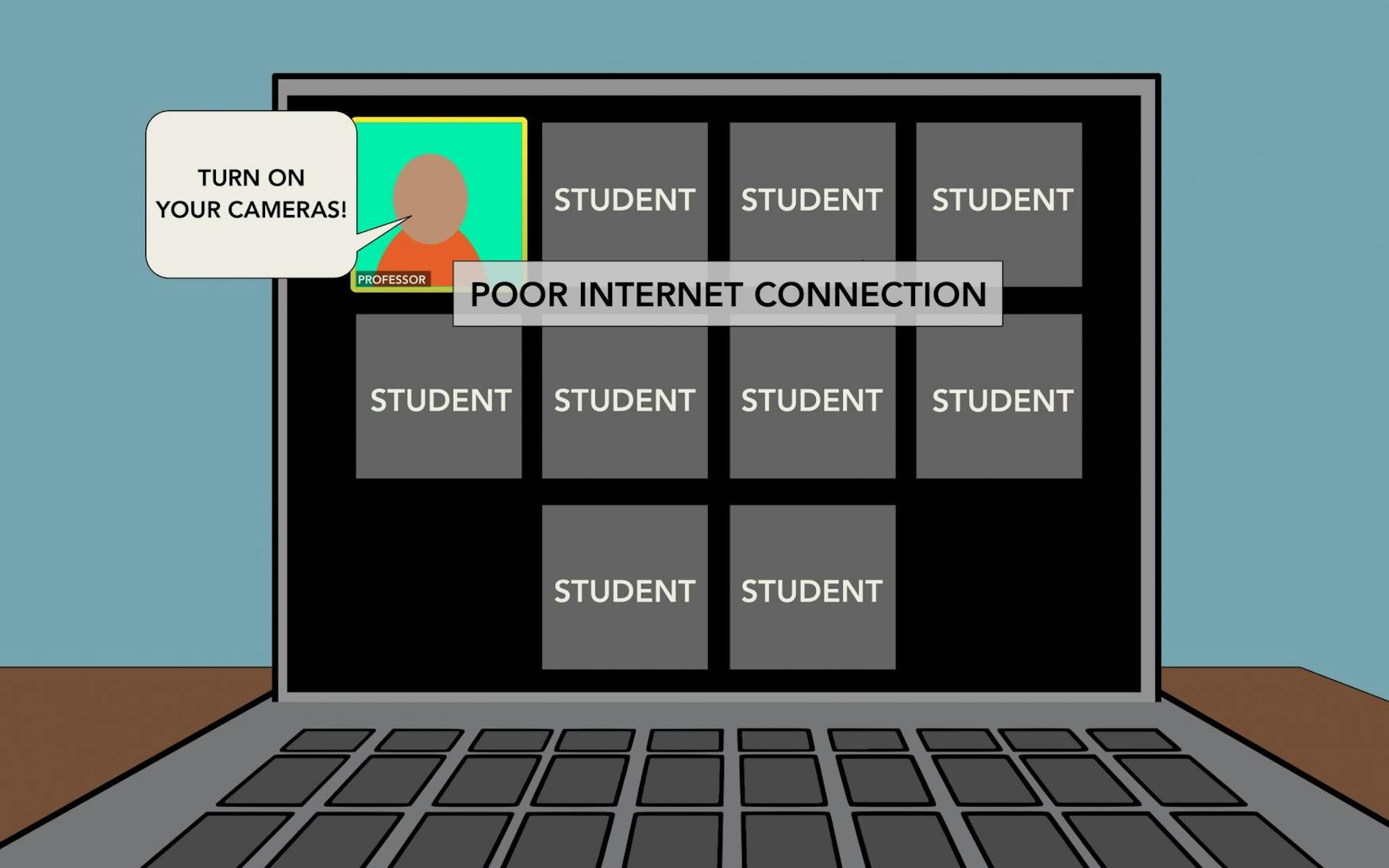Editorial: The complications students endure during a virtual academic year
The transition to virtual learning due to the COVID-19 pandemic has presented many new challenges for students and professors. This board would like to take the time to identify and address some issues we have noticed after several months of online classes.
Slow internet speeds make class participation more difficult, and professors should take this into account when grading students on participation. Many professors require students to post regularly on Latte already, so using these posts as an alternative to speaking in class for students whose Wi-Fi isn’t fast enough ensures that these students have an equal opportunity for success.
This board has also observed that in some classes, students are asked to take timed quizzes over Zoom. When they complete their quizzes, they have to take a picture of their answers to upload for grading. However, upload speeds, especially for images, can be slow at times, and the time that students take to wait for their answers to upload should not count toward their time for taking the quiz. As an alternative, professors should consider recording the quiz session on Zoom, either during the whole quiz or just at the end when students have finished, and having students hold up their finished quiz to the camera so that instructors can ensure that the work they submit afterward is the same work they completed during the quiz. This will eliminate the need for a speedy upload requirement.
Another issue with online testing arises when students are asked to use programs on their phones to monitor and prevent cheating. If students receive calls during a test while using these programs, they may be flagged as cheating. This presents an additional and unnecessary layer of anxiety during the COVID-19 pandemic.
Additionally, as students’ online presence continues to increase due to the COVID-19 pandemic, some professors have mandated that students keep their cameras on throughout classes, which can range from 50 minutes to an hour and a half. However, for some students, prolonged camera usage is not feasible for a variety of reasons. The first is, as previously mentioned, that students may lack access to high-speed internet connection. As a result, using their camera during class can cause further connectivity issues. This board urges professors to allow students to turn off their cameras during class to help ease the strain they may be experiencing with their internet connection.
Prolonged exposure to teleconferencing platforms like Zoom can lead to Zoom fatigue. Typically, students learn through a combination of verbal and non-verbal cues. However, through Zoom, learning has become heavily dependent on verbal cues. Students are forced to pay attention to the professor, their classmates, the chat function and sometimes screen sharing, all of which can lead to exhaustion. It is also important to recognize that students may face external distractions, including roommates engaging in other activities in the same space or family members that might walk in at any time.
Also, prolonged camera use can increase anxiety and stress. With attention expected to be on both classmates and the professor, this can result in feelings of prolonged and uncomfortable eye contact, which can be distracting to students who worry about how they may appear to others. The board would like to urge professors to remain cognizant of the increased demand virtual classes can have on students' mental well-being. Additionally, the board recommends for those struggling with Zoom-related anxiety to try the ‘hide self-image’ function, which may help to ease the constant concern about how one appears on Zoom.
Furthermore, this board would like to reiterate to professors the importance of leniency in regard to attendance and participation policies in the final weeks of classes. Especially as the weather turns colder and more students may be dealing with sickness, it is vital that professors take these added strains into account when they decide whether to penalize students for irregular attendance or inadequate contributions to class discussions.
Also, in two weeks as many students living on campus will transition to taking classes and completing final exams from home, this board wants to remind professors of various complications that may arise from this change. Some students will be balancing different time zones and strenuous family dynamics, while also adjusting to having fewer support systems than when they were on campus. Students may be sharing computers, work spaces and other resources with family members during the final weeks of classes and into the examination period. Additionally, students returning home from living on campus may experience a number of factors that slow down internet speeds, such as sharing one Wi-Fi network with many family members, taking classes from rural locations or lacking the financial resources for better broadband speeds. In light of these changes, it is important for professors to consider these potential complications when interacting with students.
Finally, this board wants to remind professors to remain understanding of students’ varying situations, especially as many students shift to taking classes remotely from home. Some students may feel less comfortable turning their cameras on and showing their home space to professors and other students over Zoom. Taking classes from home can exacerbate socio-economic differences between students in terms of resources, WiFi accessibility and flexibility of schedules. This board would like to remind professors that students should not be penalized for factors that are out of their control.



Please note All comments are eligible for publication in The Justice.